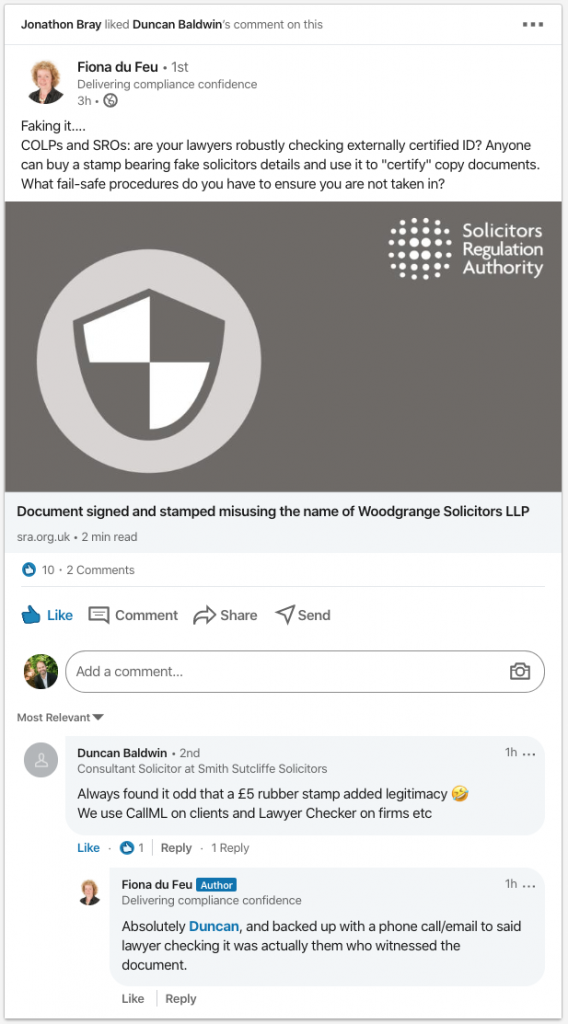Price transparency: SRA back on the hunt for non-compliant websites

I’m almost fed up of writing about the SRA Price Transparency Rules.
But it’s one of those issues that keeps grabbing headlines.
After a brief reprieve to allow solicitors to take steps to ensure their very survival during a global pandemic, the SRA is now back on the case. Because, of course, checking that solicitors are correctly expressing VAT in pounds and pence not percentages, is just the sort of thing that they should be focusing on.
We recently warned that we have started seeing £1,000 fines being issued to firms who fail to comply with the Price Transparency Rules. From a pragmatic point of view, it is worth spending a little time to make sure you have got your website right, rather than spending a lot of time later arguing with your regulator.
Okay, I do have some sympathy with the SRA. They are under intense pressure from those above them to improve access to legal services.
The Competition and Markets Authority (CMA) is to look again at the legal market, following its 2016 report in which price transparency was identified to a barrier to competition. This implies that not enough progress has been made.
Responding to the CMA’s recent call for evidence, the Legal Services Board (LSB) said:
“Currently there is scope for providers to publish wide ranges of likely prices, but this does not necessarily meet the spirit of the rules and may not actually give helpful information to prospective customers.
It is important to note that relatively low levels of compliance have been achieved, even where – as is the case with the Solicitors Regulation Authority and Bar Standards Board – mandatory rules have been imposed. The picture looks considerably worse, however, where regulators have only set out voluntary guidance…
As we develop our policy statement, we are increasingly of the view that all regulators should set mandatory requirements and enforce them robustly.”
Pretty damning stuff.
But something else the LSB said has caught the eye, too:
“There is still a significant dispersion of prices for the legal services sector. Where firms were behaving more competitively, we would have expected to see a narrowing of this dispersion.
There is no consistent pattern of the spread of prices, nor any clear trend between 2017 and 2020. Indeed, our evidence suggests that most prices, regardless of complexity of case or practice area, are increasing.”
Isn’t it interesting how the narrative has changed in quite a short space of time? When the Price Transparency Rules were implemented in 2018, the message was that this was all about allowing the public to make ‘informed choices’ about their solicitors. We were told that the problem wasn’t prices per se, but that people perceive lawyers to be too expensive and so never pick up the phone.
There is now a clear expectation that price transparency should drive prices down.
Are we really surprised?
If you haven’t read our recent refresher on price transparency, you can access that here.
Guidance

New Law Society Practice Note: Closing down your practice – regulatory requirements
In what we hope is a practice note that none of our readers will be forced to access, this is one of those that’s good to know is there. If you are thinking of retirement, you need to understand the implications of closing versus selling or bringing in new partners.
Updated SRA Guidance: Granting authority to withdraw residual client balances
This is a useful note on how the regulator expects firms to deal with those pesky client balances that you just can’t shift. Remember, leaving old balances in the client account is not an option, and likely to result in a qualified accountant’s report.
Legal Ombudsman: Overview of annual complaints data 2019/20
An interesting read, particularly the 7 practical ways to avoid complaints getting to the LeO in the first place. This resource is essential for complaints managers, but would undoubtedly benefit all solicitors’ understanding of the LeO scheme.
SRA webinar: Cybercrime – keeping your firm and clients safe
At only 21 minutes, this should be required viewing for all law firm staff (and a free CPD boost before the end of the practising year, just saying).
Spotted on LinkedIn

Michelle Peters on reducing negativity in your life – I really like the concept of moving into creation rather than consumption mode

Fiona de Feu on checking certified ID – why on earth do we rely on a rubber stamp for legitimate certification?
Question of the week

What other (non-legal) services can solicitors provide?
An SRA-regulated firm does not have to restrict itself to the practice of law. It turns out not a lot of people know that.
Have a look at Appendix 2 to the SRA Authorisation of Firms Rules for a full list. As well as accountancy, management consulting, financial services and estate agency, it also includes the rather beautifully imprecise “other professional and specialist business support services…”
(Bailiff, anyone???)
In short, your law firm could open up other business lines if you so wish. Do take care to consult your insurers, of course!
ABSs may also qualify as Multi-disciplinary Practices (MDPs), which are the ‘one stop shop’ law firms that the Legal Services Act was supposed to enable. Under an MDP, each service line can be regulated by separate regulators. So, for example, the SRA would essentially ignore the accountancy side of the business if the ICAEW were involved in regulating the bean counters.
But if adding revenue streams is part of your strategy, you should also consider whether these services can be operated outside of the SRA’s reach. The old separate business rules have pretty much fallen away, in favour of safeguards to protect clients’ best interests.
So if you have always harboured an ambition to start an unregulated will writing business, you can do so as an entirely separate entity. And under the SRA Standards and Regulations, you could even have practising solicitors writing and advising on said wills since it is not a reserved activity.
I think this is what they mean when they refer to flexibility.
Disciplinary decisions

- Kieran Patrick O’Connor – agreed to removal from the roll under a regulatory settlement agreement, after waging a campaign of harassment against lawyers representing him.
- Michelle Louise Craven – trainee solicitor escapes sanctions from the SDT for billing £3,000 “in anticipation” of work – never completed – on multiple occasions. Had she been more experienced, under less pressure, and had the firm’s own policies been clearer, we suspect that the SDT would not have been so understanding.
- Maria Williams – struck off for holding client money back intended for counsel’s fees, dishonestly altering counsel’s fee note, and begging her supervisor to withhold incriminating evidence from the SRA.
- Ravi Khosla – fined £17,500 after having been convicted of a sexual assault on a night out. Not an ‘abuse of power’ case.






